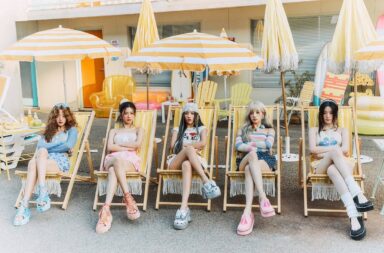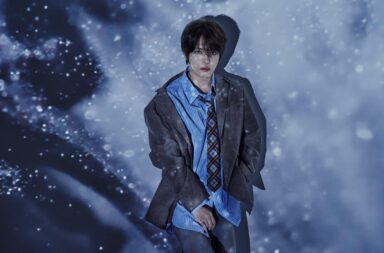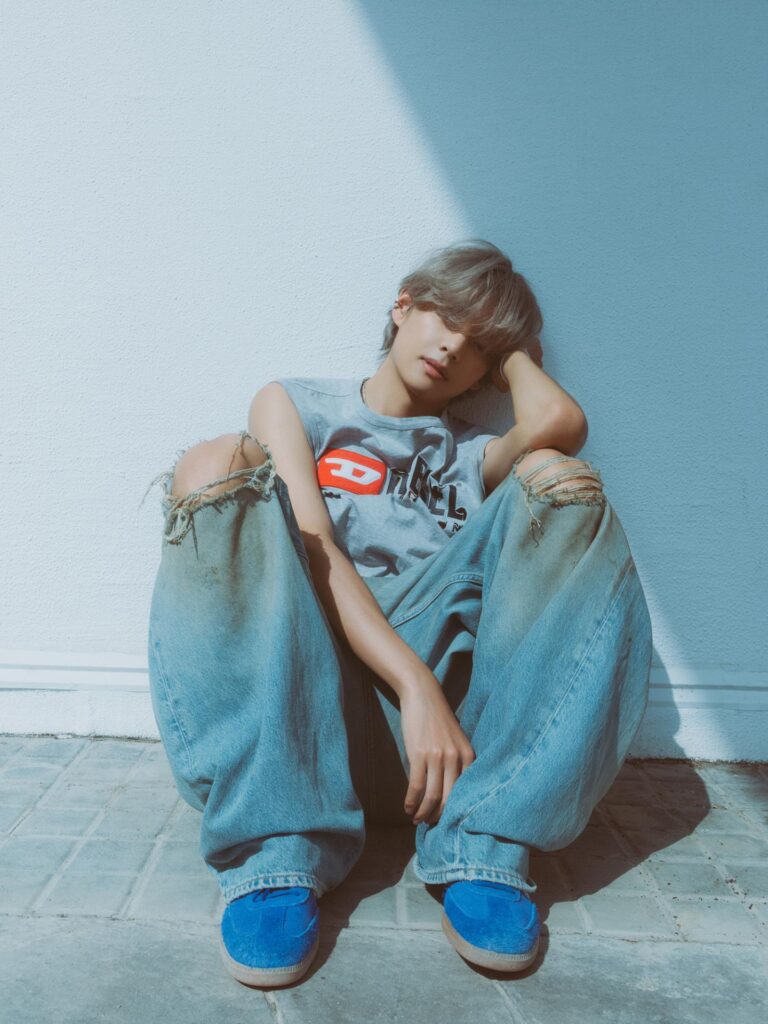
One of the joys of this “Chapter 2” era for BTS is seeing how each member approaches his solo projects and establishes an identity distinct from the group’s. Vocalist V, the last member to release official solo music, does not set out to upend expectations with his first mini-album Layover. Rather, he leans into the colors that have defined him as an artist and the sounds that fit perfectly with his personal taste. V has long been an aficionado of jazz and R&B, and these influences are all over Layover.
V commissioned Min Hee-jin (CEO of Hybe’s subsidiary Ador) to collaborate with him and oversee music and video production, and even promotions for Layover. Min Hee-jin, with her experience as an artistic director at SM Entertainment, as well as her massive success building NewJeans, excels at establishing a distinct and cohesive aesthetic, both musically and visually. All of the lo-fi, jazz-inflected R&B songs on Layover revolve around a person yearning for a past relationship. With smooth transitions between songs, the album is best when listened to in one sitting. Conceived as a visual album, Layover is accompanied with music videos that incorporate retro sets and film techniques, reinforcing the songs’ feelings of longing and nostalgia.
One downside to V’s collaboration with Min Hee-jin is that her minimalistic approach can make songs initially seem flat and repetitive, especially in the first half of the album. The first three tracks, “Rainy Days”, “Blue”, and “Love Me Again”, all feature choruses with minimal lyrics. In particular, the chorus of “Blue,” consists of only one word: blue. The spareness in both lyrics and instrumentation (save for a drum and electric guitar) can make the song feel empty, and it relies on V’s husky baritone to create an impact.
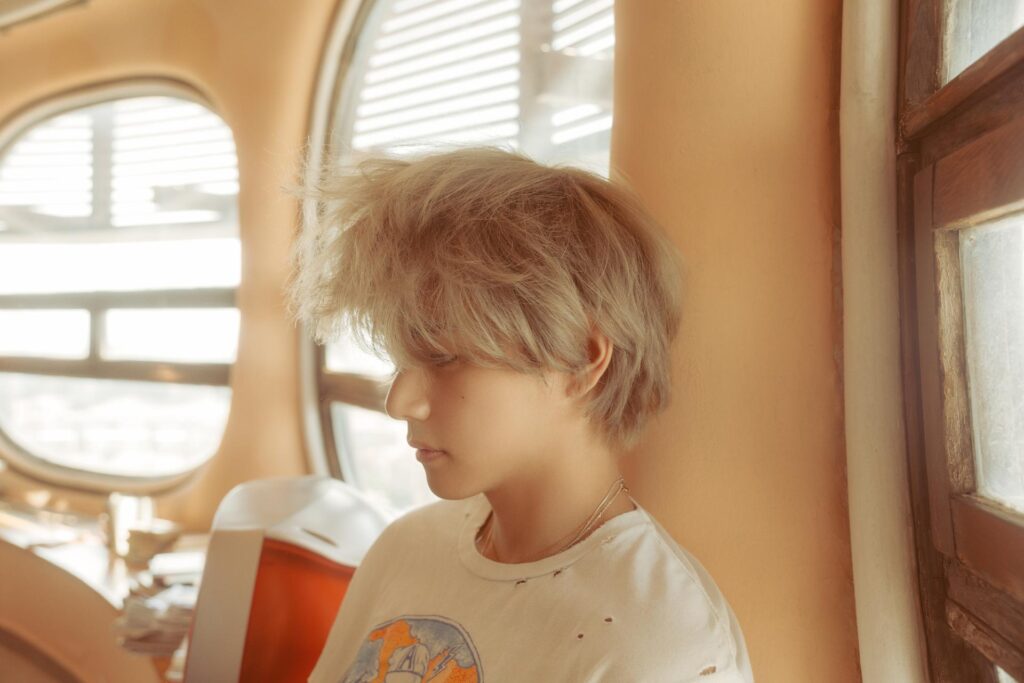
V’s own lyricism would have been welcomed in this album (he does not have any song credits on Layover). Frequently centered around nature, V’s previous self-composed songs (such as “Winter Bear”, “4 O’Clock”, or even “Inner Child”) utilize visual images that evoke strong emotions. I could imagine the heightened effect if “Rainy Days” had more evocative imagery, or if “Blue” further explored the connotations of colors in its lyrics.
At the same time, after multiple listens, repetition in Layover emerges as a meaningful device, mimicking the condition of a person preoccupied with the past. “Rainy Days” begins with tinkling piano keys, falling rain, and familiar cell phone noises (alert bells, typing keys, the swoosh of a sending message). When the noises recur, they signal how often the singer is inside on a rainy day, alone with his memories. Repetition in the song also emphasizes contrasts; in the second verse, the key drops, and the subsequent chorus feels more melancholy in the lower key.
While all of the songs share subject matter and have similar vibes, each one illustrates different aspects of yearning. “Slow Dancing”, the title track, focuses on the singer’s dreams of reuniting with his former lover. Elongating the words “we could be slow dancing” in the chorus, V’s delivery gives this section a dreamy, romantic feeling. “We could be romancing the night away,” he croons in the languidly paced chorus.
In an unusual turn for a K-pop song, the last third of “Slow Dancing” is a instrumental-only outro, dominated by jazz flute. Seemingly improvisational, the minute-long outro creates the feeling of getting lost in fantasy, even if just for momentary escapism. The album also includes a version of “Slow Dancing” with piano replacing the flute. Without the airiness of the woodwinds, the piano version still grooves, but the more wistful undertones of the song also come through.
“Love Me Again”, the first pre-release single, stands out in terms of vocal performance. The first verse showcases V’s rich baritone voice as he calls out to the person who left him, “If ever you regret this, won’t you let me know?” It’s as though he is attempting to draw that person back in with the warmth of his voice. V then shifts out of his lower register in the pre-chorus as he confesses:
Fine, I will be honest with you
Put it all out there
I think about you all the time
Where you are, who you’re with
Lost without you, baby
As he sings ad-libs with these lines, his voice becomes more airy, matching the vulnerability of the lyrics. Then, in the chorus, V’s rasps while singing “I wish you could love me again” convey hurt and longing, though at the same time his pleas feel restrained and not desperate. He switches between saying, “I wish you would love me again” (emphasis mine) and “I wish you could…”, implying uncertainty about the reasons for the breakup.
R&B track “For Us” suggests the other person’s perspective, as the song opens with an artificially high-pitched opening from another vocalist:
You went from my home to
“It was nice to know you”
And it breaks my heart
That we gave it our best shot
Now I’m in California
I’m still waiting’ for ya
Will you change your mind?
I would give it all up
For us
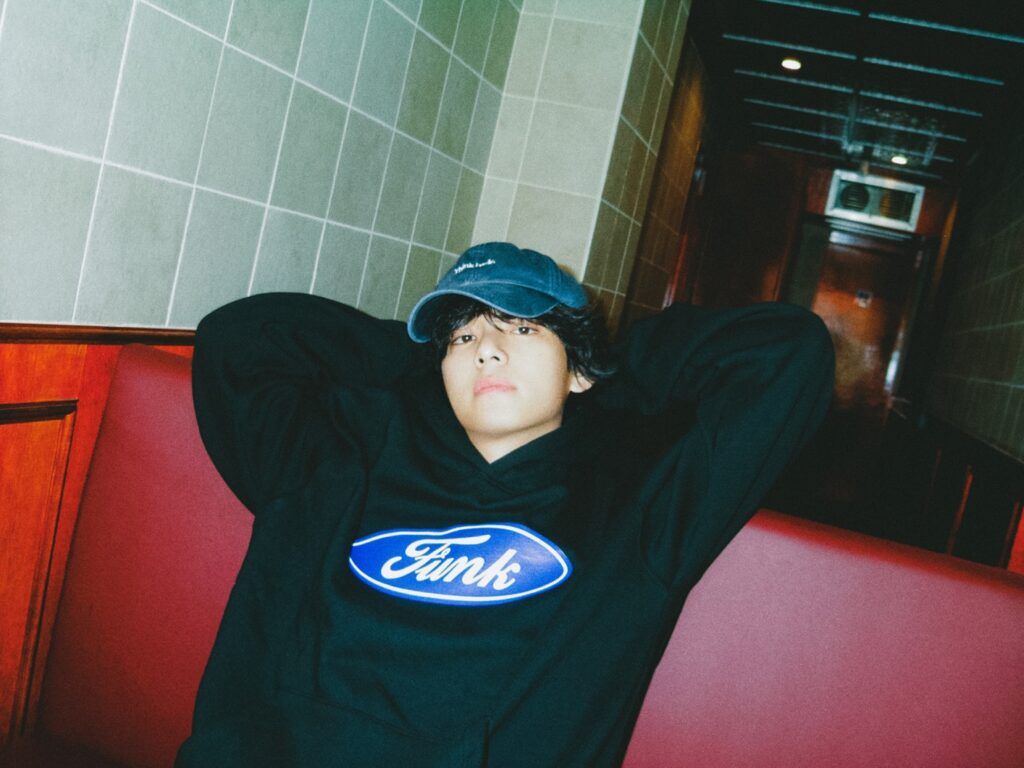
In the middle of the song, this vocal returns, but is cut off with the sound of a cassette tape and a distorted fade out. V takes over from the line “That we gave it our best shot,” and then says, “Now you’re in California,” affirming that the first voice represents his ex’s. “For Us” suggests that there has been mutual pining for the relationship, though it remains ambiguous whether the other person still feels this way, or whether the cassette sounds stand in for memories.
As a whole, Layover is a solid introduction to V’s tastes and sensibilities as a solo artist. In an interview with Rolling Stone, though, V shared that he is writing songs that differ widely from those on Layover. The word “layover” indicates a period of rest before another leg in a journey. It could describe the feeling of limbo for a person yearning for closure for his past relationship, or the transitional period BTS is currently undergoing due to military enlistment and solo projects. Most of all, though, the word reflects V in this point of his career: he has made his first stop in his journey as a solo artist, and so much more potential lies ahead.
(Rolling Stone. Soundcloud. YouTube [1] [2]. Lyrics via Genius [1] [2] [3], Images via HYBE Entertainment).
